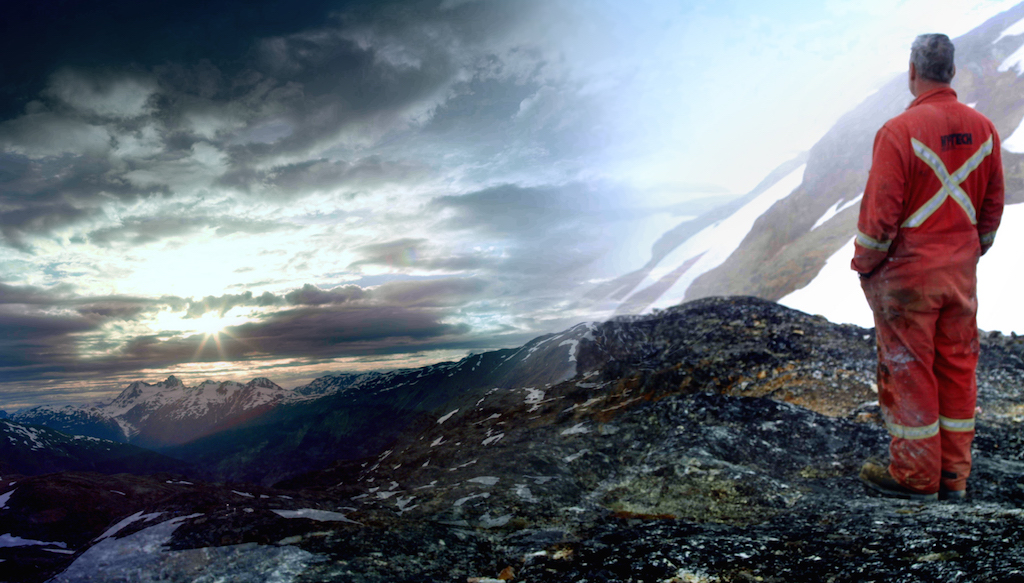Like this article? rabble is reader-supported journalism. Chip in to keep stories like these coming.
Canada’s Nettie Wild has never shied away from tough topics — from the Zapatista movement in Mexico (A Place Called Chiapas) to delving into the darkness of addiction in FIX: The Story of an Addicted City, the director has combed the social justice landscape.
In her latest documentary, Koneline: our land beautiful, she turns her lens simply on landscape.
“At 63, I have given myself license to paint in pictures,” writes the director in an email to rabble. The filmmaker adds that she wanted to examine an issue which cut through “the roar of rhetoric.”
Premiering at Toronto’s Hot Docs festival at the end of the month, the feature film will also be headed to a TV channel near you.
Koneline (translated to “our land beautiful” in the Tahltan language) focuses on the “golden triangle” of land in northwest B.C. where copper and gold mining companies are busy drilling into prime territory where locals hunt and fish, and mountain sheep breed.
Shot lovingly with cinematic grace by Van Royko, you will not soon forget the arresting images in this film — which also contains a bloody moose-hunting scene for those who might find this difficult to stomach. I’m struck by a remarkable sequence where a helicopter positions a 16,000-pound transmission tower so workers on the ground can tackle it and place it in a special stand. Shots of the miners and workers are given equal due in this documentary and they are stunning.
In her email, Wild describes having “tailgate screenings” (a monitor propped up on the back of a truck) with the linesmen.
“They saw their work as they had never imagined it before,” she observes. “There is the elegance of the engineering, the magnificence of the mountain backdrop, and the brawn and dexterity of the linemen and the raw gash of the massive clear-cut. All the contradictions in one frame.”

Wild has chosen to frame this documentary as a series of cinematic canvasses. Indeed, she describes the process of creating the film as putting “beads on a string, or like the rifts of jazz.” Each person featured, a unique “bead.”
“You’ve got to appreciate what we have out here, God did a good job,” reflects one white hunter, who worked in the tar sands of Alberta and now hunts with a crossbow.
“I’ve seen the utter destruction of [the tar sands] and to imagine that here, I don’t know,” he says as his voice and mind drift off.
The Red Chris Mine has a tailings pond — let’s not forget the kind of leakages that happened in Fort McMurray, Alta. that claimed wildlife and vital land.
Imperial Metals is busy boring into the land looking for what many say are great deposits of copper and gold. Meanwhile, members of the Tahltan nation are divided. Many elders are upset about the commercial incursion while some younger members are employed by the mining company.
“What they are fighting for, I’m drilling into it,” a young Tahltan worker notes ironically. He adds, he’s there because “I need to put food on the table for my kids.”
Just down from the mining area, Tahltan writer Oscar Dennis makes daily pilgrimages to a river to get fresh water for his parents — his mother has cancer.
“Eventually, everyone gets sick [because] they ingest too much toxins during their life,” observes Dennis.
“We may have our land, but we may as well be f**king tourists on it.”
Different characters and viewpoints emerge and their stories are interlaced seamlessly by Wild.

There’s a female outfitter who takes tourists out on horseback, the miners, a B.C. minister, Indigenous elders, hunters from different backgrounds and finally, the land itself is its own protagonist.
“The land has a personality and everything is alive,” intones one individual.
Thankfully, Wild has chosen not to overlay a narrative voice or explainer notes. The film gently moves along an arc that closes when Tahltan elders, blocking the main road to the mine, come face to face with mining executives and a government minister.
Koneline is crafted with care in reference to its title — which denotes inner and outer landscapes.
Wild says her aim was to “create a cinematic experience that audiences can absorb through their eyes and ears, through their skin.”
Mission accomplished.
Koneline is featured at the Hot Docs Festival:
Friday, April 29, 6:30 p.m. – TIFF Bell Lightbox
Sunday, May 1, 12:45 p.m. – TIFF
Saturday, May 7, 3:15 p.m. – Hart House
Koneline will also be broadcast on Super Channel, the Knowledge Network and Canal D. Air dates are to be announced soon.
The film is available for screenings — contact the production company here.
June Chua is a Berlin-based journalist who regularly writes about the arts for rabble.ca.
Photos courtesy of Canada Wild Productions.
Like this article? rabble is reader-supported journalism. Chip in to keep stories like these coming.



